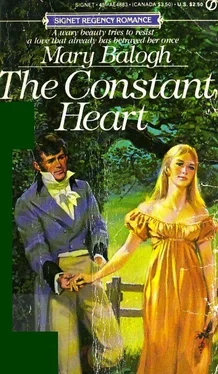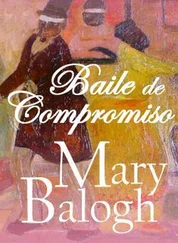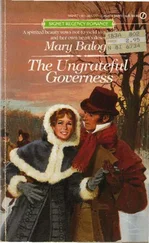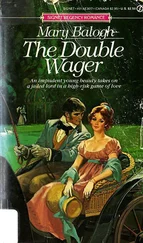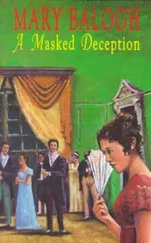Rebecca smiled to herself. Uncle Humphrey had always been terrified of fresh air, and he rarely walked farther than from the dining room to his sitting room, or from his coach to his church pew. And his was not an attitude that had come only with advancing age. Indeed, he was barely fifty years old now. He had always been the same as far back as she could remember. Whenever he used to call at the parsonage to visit Papa, when Papa had been the vicar, he would always arrive in a closed carriage, summer and winter, and have to be escorted into the house by a footman, on whom he leaned heavily. Yet he must have been little more than thirty at the time she was remembering.
And his complexion always preoccupied Uncle Humphrey, too. He had continued to wear paint and powder on his face long after it became unfashionable for men to do so. The paint protected his face from the elements, he had explained to Papa at one time. And even now if she should happen to see him at night, his face would be heavily smeared with creams to prevent wrinkles. And indeed he was remarkably youthful looking for a man of his years. Somewhat portly, it was true, but he carried his weight proudly. He was an imposing, if a somewhat vain, figure of a man, Rebecca was forced to admit.
She had been living at Limeglade for five years now, ever since the death of Papa. Dear Papa! So deeply engrossed in the Lord's work that he had never seemed to have one thought to spare for the affairs of the world. He had been the younger brother of Uncle Humphrey, Lord Holmes, and therefore his life had been destined for the church ever since he was a young boy. But it was hard to imagine him in any other kind of life. On the death of his parents, he had inherited a sizable portion of both his mother's and his father's fortunes. Yet the money had all disappeared-not frittered away, but given freely to everyone who had asked his help, including several unworthies who had been less in need than he and his family.
Rebecca had been the sole member of her father's household after the death of her mother ten years before in the same smallpox epidemic that had carried off Aunt Sybil. She had accomplished the almost impossible-keeping house and feeding and clothing them both on almost no income. She had almost forgotten what money looked like. Yet she had been happy during most of those years. They had had a home and they had had friends. There had been no danger of starving. They were living the faith that they professed.
Yet when the Reverend Shaw had died, Rebecca was left quite destitute. She had been one-and-twenty at the time and would quite cheerfully have looked for employment as a governess. Uncle Humphrey had almost fainted away when she had made the suggestion on the afternoon following the funeral. He had indeed sat down heavily- yet gracefully-on the chair that was fortunately positioned just behind him, and fanned his face languidly with a lace-bordered handkerchief.
It was quite unfitting, he had said, for the niece of Lord Holmes of Limeglade to seek employment, albeit the job of governess was genteel work. His whole family would be disgraced. If she must insist on being useful-he had grimaced at the very thought-she must devote herself to being Harriet's companion. Harriet no longer enjoyed the company of her governess-penniless daughter of a mere country parson, poor soul-and needed someone of her own class and with her own good breeding.
Rebecca had hesitated. She hated to be beholden to her uncle. Her years with her father had made her value independence and had made her uneasy about privilege. Yet she was fond of her vain, foolish uncle and of his high-spirited daughter, despite her volatile temper. She had agreed to live with them on the condition that her allowance be small, only what she could feel she had earned as Harriet's companion. And she had continued to view herself more in the light of employee than relative, despite Harriet's apparent lack of interest in her company and despite Uncle Humphrey's frequent complaints about her plain attire and charitable works.
Things were different at Limeglade now, of course, with a new Lady Holmes. The baron had taken his daughter to London for a Season two years before, with the intention of finding her a husband suitable to his consequence. Harriet had returned unattached-though Rebecca had learned afterward by piecing together various hints and slips of the tongue that great scandal had been narrowly averted when she had been about to run off with a half-pay officer.
But the baron himself had brought home a new wife-a wide-eyed, rather frightened young girl who looked no older than Harriet, though in fact she was three years her senior. Rebecca had been horrified. Uncle Humphrey obviously doted on his prize and felt that he had conferred a great honor on her with his title," his wealth, and his imposing person. Yet it seemed glaringly clear to Rebecca that poor Maude had been the victim of ambitious parents. Several times she had caught an expression of distaste or even revulsion on the girl's face when she looked at her husband. She behaved with perfect correctness and showed him outward deference and even affection. But Rebecca was in no doubt that her new aunt was unhappy. Harriet did not help; she refused to recognize almost the very existence of the other woman.
Rebecca paused for a moment on the dirt road. Should she turn into the woods to her right and walk through them to the pasture? Or should she add an extra half mile to her journey by walking farther along the road until the pasture met it? The sunlight was so lovely-she glanced up to the clear blue sky. It would be a pity to plunge into shade and darkness. And she was really in no great hurry. She walked on.
She had resented Philip when he first came to the village. He had seemed a usurper-occupying Papa's pulpit, living in their house. She had forced herself to be civil to him and had gradually warmed to him as it became clear that he was almost as eager as Papa to minister to the needs of his parish. And she had had to admit that his sermons were easier to listen to than Papa's had ever been. She had resumed some of her old activities-visiting the sick and the elderly, distributing most of the money that her uncle insisted on giving her, decorating the church every week with flowers.
Without even realizing that it was happening, she had found that a friendship was developing between her and the vicar, over whose handsome person many a young female heart was sighing. Several times they had talked about the need of a school for the village boys. It had seemed like an impossible dream until one day he had told her that he had contacted an acquaintance of his, a gentleman from London, and had been offered a dizzyingly large sum of money with which to set up a school. The only problem was that they would not immediately be able to hire a teacher. The initial costs of a building and basic equipment would be too high. Rebecca had eagerly agreed to share the teaching responsibility with the Reverend Everett. It would mean teaching two days each week.
It had seemed almost natural a short time after that to receive Philip's undemonstrative proposal of marriage. She would be a good helpmeet, he had explained. Not wife. Not friend. Not lover. Just helpmeet. Yet Rebecca had cheerfully accepted. She was of an age when she must marry or resign herself to a life of spinsterhood. She was past the age for love. Her one experience with that emotion had brought enough pain and disillusionment to last a lieftime, anyway. She could do worse than be Philip's helpmeet. With him she would be living the life that she had always loved. And perhaps there would be a child or two. She would hate to think of going through life without experiencing motherhood.
She looked ahead along the road to see how far she still was from the shortcut across the pasture. As she did so, she became aware of two female figures approaching across the field to her left. The Misses Sinclair were also taking a shortcut from their father's house a mile away. They were waving to her and smiling.
Читать дальше
